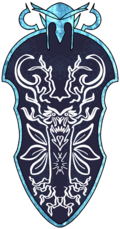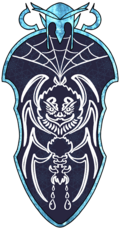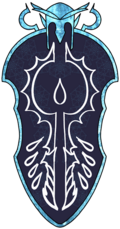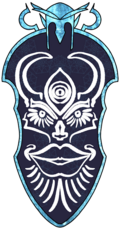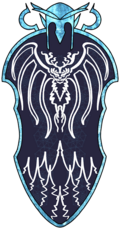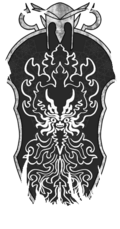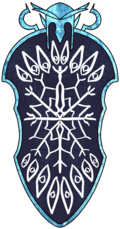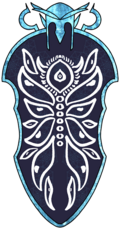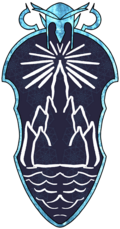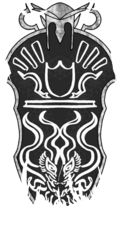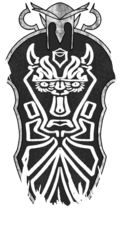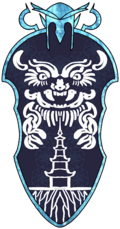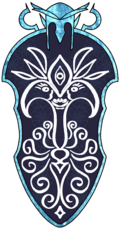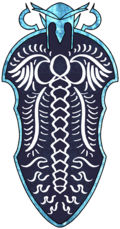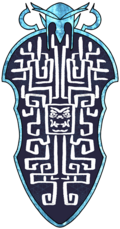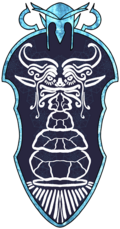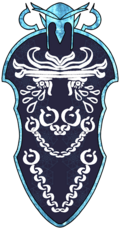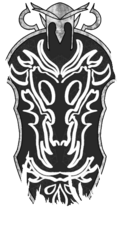More actions
| (4 intermediate revisions by 3 users not shown) | |||
| Line 31: | Line 31: | ||
==Heritage Traits== | ==Heritage Traits== | ||
When designing a Character, Proficiency Points allow for a limited Ability selection with Point Buy Packs. Heritage Traits adds free Packs and Mechanics on top of that to help with cultural themes. Free Packs grant Abilities usually, while Mechanics change the way a character functions in Roleplay through subtle, and usually out of Combat ways. In essence, Mechanics just add aesthetic flair that invest in the niche of each culture. Free Packs never raise Proficiency Points, but the character must be able to purchase them normally. (ex. if a character is a certain Affinity that locks them out of a category, they cannot take that specific free pack and must choose the alternative option.) If a Free Pack grants Magic of some type, that Magic can be of any Alignment the character can normally choose, or limited to a select alignment, which will always be written in the Free Pack description. '''It is not possible to play Mixed Heritage Sihndar with Mixed Mechanics'''. You may make them appear Mixed Heritage visually, but due to their Mechanics being derived from the Drowda Taint + Sihndar Heritage, it is not allowed to pick and combine Mechanics as normally would with Mixed-Heritage Characters. Mixed Heritage Sihndar derive all Mechanics from the Sihndar Heritage Traits always. | When designing a Character, Proficiency Points allow for a limited Ability selection with Point Buy Packs. Heritage Traits adds free Packs and Mechanics on top of that to help with cultural themes. Free Packs grant Abilities usually, while Mechanics change the way a character functions in Roleplay through subtle, and usually out of Combat ways. In essence, Mechanics just add aesthetic flair that invest in the niche of each culture. Free Packs never raise Proficiency Points, but the character must be able to purchase them normally. (ex. if a character is a certain Affinity that locks them out of a category, they cannot take that specific free pack and must choose the alternative option.) If a Free Pack grants Magic of some type, that Magic can be of any Alignment the character can normally choose, or limited to a select alignment, which will always be written in the Free Pack description. '''It is not possible to play Mixed Heritage Sihndar with Mixed Mechanics'''. You may make them appear Mixed Heritage visually, but due to their Mechanics being derived from the Drowda Taint + Sihndar Heritage, it is not allowed to pick and combine Mechanics as normally would with Mixed-Heritage Characters. Mixed Heritage Sihndar derive all Mechanics from the Sihndar Heritage Traits always. | ||
===Mechanics=== | ===Mechanics=== | ||
* Sihndar take less damage when hurt by Spirits or those possessed by Spirits. If a Mystech Spirit-Type (incl Bound Automata) Character applies -2 HP damage, reduce that by -1 HP. | * Sihndar take less damage when hurt by Spirits or those possessed by Spirits. If a Mystech Spirit-Type (incl Bound Automata) Character applies -2 HP damage, reduce that by -1 HP. | ||
* Sihndar cannot become Afflicted, some exceptions may apply in Soul Bargains, and some greater Entities like Gods and Arken can still force infect them. | * Sihndar cannot become Afflicted, some exceptions may apply in Soul Bargains, and some greater Entities like Gods and Arken can still force infect them. | ||
* Sihndar can perform the Weakening Ritual on a Greater Vampire, which does not kill them (ported back to a safe base), but turns them into a Fledgeling Vampire. | * Sihndar can perform the Weakening Ritual on a Greater Vampire, which does not kill them (ported back to a safe base), but turns them into a Fledgeling Vampire. | ||
* Sihndar are immune to mind control of any type, particularly [[Adapt_Point_Buy#Mindcontrol_Pack | * Sihndar are immune to mind control of any type, particularly [[Adapt_Point_Buy#Mindcontrol_Pack | Magic Variant Mind Control Pack]] and all of its Mechanics to do with Thralling and Persuasion Dices, if used to convince them. | ||
===Sihndar Heritage=== | ===Sihndar Heritage=== | ||
| Line 250: | Line 246: | ||
* '''[[Unionism]]''': A very small minority of Unionist Sihndar exist in Regalia and Drowda. These are either Drowda Taint converts, or one of the many Ailor who are not Drowda Tainted that travel to Drowda to do work there for the Regalian Government or Sihndar Councils. | * '''[[Unionism]]''': A very small minority of Unionist Sihndar exist in Regalia and Drowda. These are either Drowda Taint converts, or one of the many Ailor who are not Drowda Tainted that travel to Drowda to do work there for the Regalian Government or Sihndar Councils. | ||
* '''[[Fornoss]]''': A very small minority of Fornoss Sihndar exist in Regalia and Drowda. These are either Drowda Taint converts, or descendants of the various Velheim Ailor dominated Sihndar Holds close to Drowda, due to the proximity of the Three Skags and Drowda. | * '''[[Fornoss]]''': A very small minority of Fornoss Sihndar exist in Regalia and Drowda. These are either Drowda Taint converts, or descendants of the various Velheim Ailor dominated Sihndar Holds close to Drowda, due to the proximity of the Three Skags and Drowda. | ||
* '''[[ | * '''[[Khama]] & [[Evolism]]''': There are virtually no Sihndar who worship these religions. For Khama, the Sihndar think it's weirdly colonial to start worshiping a largely homogenous ethno-religion. Lastly, Evolism represents everything that is wrong with the worship of Spirits and sin to the Sihndar. To a point, the Sihndar might even consider Evolism worse than [[Minor Faiths#The Mortis Cult|Death Cultism]], because at least Death Cultists have simple beliefs that do not corrupt the good nature of people with seductive bargains and promises of power. The Sihndar obviously also detest all forms of Death Cultism, especially the Ordial variant, because death has an inverse proportional reaction on the creation and festering of Spirits in an area. | ||
==Culture== | ==Culture== | ||
| Line 290: | Line 286: | ||
|Processors = Birdsfoot_Violet, Okadoka, FireFan96 | |Processors = Birdsfoot_Violet, Okadoka, FireFan96 | ||
}} | }} | ||
[[ | [[Category:Heritages]] | ||
Latest revision as of 01:06, 10 January 2025
| Sihndar | |
|---|---|
 | |
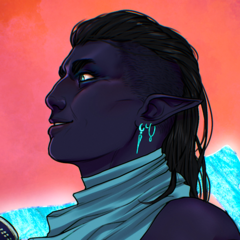 | |
| Nation State | Drowda (and others) |
| Ruler | Hold Councils |
| Other Present | Varied |
| Languages | Altalar |
| Religion | Varied |
| First Recorded | 0 AC |
| Demonym(s) | Sihndar |

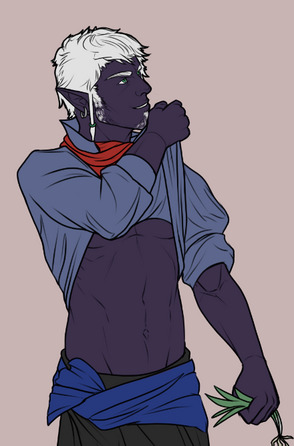
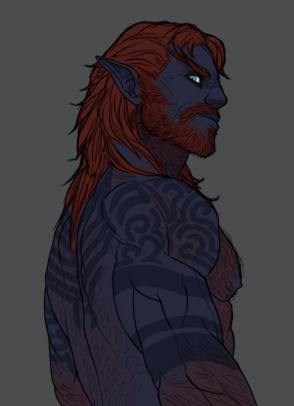
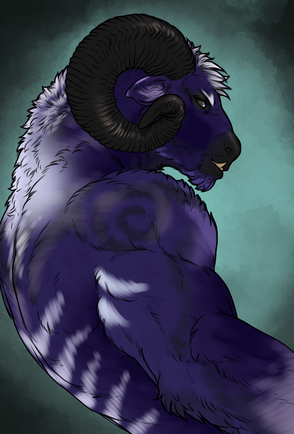
Holding the first and last line of defense against the Greater Demons, the Sihndar were an Allorn Cult that weathered the Cataclysm and eventually became its own people. They saw firsthand the death and destruction that a full Void Invasion brought onto Aloria, and picked up the weapons left behind by all the people that were brought to extinction by the Spirit invaders. Despite their world-renown reputation for being the most skilled Spirit hunters and fighters, as well as excellent Elven warriors in their own right, they fight a losing war against the Spirits that enroach ever further to expanding their domain on Aloria. With the Void Invasion three centuries past and the world believing that the next one will never come, the Sihndar occupy a forgotten corner of the world that is nonetheless crucial to the peaceful existence of other nations across the world. From the scars left behind by the last Void Invasion, the Sihndar hold the line against the Spirit Sovereigns that try to break out of Drowda to corrupt and control the wider world. Hope is not all lost however, as there are yet allies to be found in the wider world: most of all Regalia, the city where everything comes together. Note, the Sihndar Page is considered very dense and long due to their complex heritage and historical narration. If you are new to the server and want to play a Sihndar, it is recommended you seek help from another player or a Staff member in a Discord Ticket to help you through the process of understanding Sihndar Lore.
Design
Despite what one might think from first appearances, the Sihndar are not a daughter-people of the Allorn Elves widely speaking. Though the majority of them are indeed Elves and descend from the Allorn Elves since the collapse of their Empire, to be Sihndar transcends individual heritage, and involves the bearing of a burden most of the world is keen to forget. What makes the Sihndar a Sihndar, is called the Drowda Taint. When a person accepts the Drowda Taint in their body and soul, they become Sihndar and often accept both their cultural as well as their historical heritage as their own. There are Sihndar of every variety of people of Aloria ranging from Eronidas, to Ailor, to Asha, to Urlan, to Songaskian. Additionally, Sihndar who reproduce with other Sihdar also continues to sire Sihndar, thus leading to expanding lineages. The exact explanation of what the Drowda Taint does to a person is discussed further below, including the mandatory visual aspects. Beyond that, Sihndar can appear like any of the People of Aloria, just with modified traits. A large part of the Sihndar population descends from the initial Elves caught in the magical reverberations of the Cataclysm on Drowda, having the Drowda Taint forced on them. Since then, however, their population has waxed and waned from natural reproduction but more importantly incorporation of outsiders who accepted the Drowda Taint willingly to aid their cause, and thus become part of their people and struggle.
Sihndar in Regalia
Sihndar are a people that one might at first glance think have no reason to be in Regalia. After all, their struggle is thousands of miles away in foreign lands where the Spirit Sovereigns roam free and threaten the world. This section discusses some basic premises for why a Sihndar might want to be in Regalia, which is where all of the Roleplay takes place:
- The Sihndar seek allies across the world to aid in their struggle, whether it is to invite non-Sihndar to help fight in Drowda, or to court the nobles and Emperor of Regalia for an increase in financial support and shipments of supplies for their homeland. This can also involve fostering positive relations with already existing groups and organizations by being a member.
- The Sihndar seek skills and information from abroad that might aid in their struggle back at home. Regalia is a nexus of learning and intellect, and many of the world leading theories on the magical as well as on warfare are developed in such a capital of science. This can also involve just campaigning for more awareness among the common people and collecting for home.
- The Sihndar battle Spirit Sovereigns wherever they appear, and Regalia is no exception to their presence. While the majority of them struggle to breach beyond Drowda, Regalia as a nexus of Magic and magical events has frequently been affected by Spirit Sovereigns and Dukes. As a result, many Sihndar are stationed in Regalia to help it against its own Spirit problems.
- Some Sihndar break away from their duties and their communal struggle and become Sihn-Fallar. Sihn-Fallar are Sihndar who have brazenly abandoned their duties, and decided to leave the rest of their people to their fate. Such Sihn-Fallar could exist in Regalia, because it is the capital of the world, no pleasures denied to the Sihndar at home cannot be found here.
Heritage Traits
When designing a Character, Proficiency Points allow for a limited Ability selection with Point Buy Packs. Heritage Traits adds free Packs and Mechanics on top of that to help with cultural themes. Free Packs grant Abilities usually, while Mechanics change the way a character functions in Roleplay through subtle, and usually out of Combat ways. In essence, Mechanics just add aesthetic flair that invest in the niche of each culture. Free Packs never raise Proficiency Points, but the character must be able to purchase them normally. (ex. if a character is a certain Affinity that locks them out of a category, they cannot take that specific free pack and must choose the alternative option.) If a Free Pack grants Magic of some type, that Magic can be of any Alignment the character can normally choose, or limited to a select alignment, which will always be written in the Free Pack description. It is not possible to play Mixed Heritage Sihndar with Mixed Mechanics. You may make them appear Mixed Heritage visually, but due to their Mechanics being derived from the Drowda Taint + Sihndar Heritage, it is not allowed to pick and combine Mechanics as normally would with Mixed-Heritage Characters. Mixed Heritage Sihndar derive all Mechanics from the Sihndar Heritage Traits always.
Mechanics
- Sihndar take less damage when hurt by Spirits or those possessed by Spirits. If a Mystech Spirit-Type (incl Bound Automata) Character applies -2 HP damage, reduce that by -1 HP.
- Sihndar cannot become Afflicted, some exceptions may apply in Soul Bargains, and some greater Entities like Gods and Arken can still force infect them.
- Sihndar can perform the Weakening Ritual on a Greater Vampire, which does not kill them (ported back to a safe base), but turns them into a Fledgeling Vampire.
- Sihndar are immune to mind control of any type, particularly Magic Variant Mind Control Pack and all of its Mechanics to do with Thralling and Persuasion Dices, if used to convince them.
Sihndar Heritage
As noted, most Heritages have 5 Mechanics, while Sihndar only have 4. This is because Sihndar receive their fifth Mechanic from their pre-Drowda Taint Heritage, depending on what People of Aloria their ancestors were part of. When playing a Sihndar, choosing one such Sihndar Heritage is necessary. It is not possible to combine, and if you have trouble choosing, just pick the heritage of the most important ancestor that fits your current Roleplay needs. Because there is no such thing as a Sihndar Appearance, choosing a Heritage also directly affects your Character's appearance. Characters that have the Drowda Taint applied to them in Roleplay, lose all their prior Heritage Traits, and gain the Sihndar Traits, including this one, but must choose the Sihndar Heritage of their dominant Heritage pre-Tainting.
- Ailor: These Sihndar are masters of many languages. Even for languages they do not speak, if someone insults them in their native tongue, they will know what was said.
- Skyborn: These Sihndar do not need to choose a Tech Branch, they are able to build/edit/repair any Branch. Try to be conscientious when other players feel pushed out of their niche however!
- Dragonkin: These Sihndar retain Mechanic 2 and 3 as they are presented on the Dragonkin Page. Dragon Machines and Dragons will also still acknowledge them as Dragonkin.
- Sihai: These Sihndar can telekinetically move, reshape, recolor, and restructure Jade with their mind. They can also turn any crystal-like substance or noble metal into Jade.
- Dwarves: These Sihndar gain +1 Main Defense Stat while another Dwarf or Sihndar is within a 5 block range, which can break Cap up to 11. This mechanic can stack up to a +2 bonus.
- Isldar: (regardless of Life/Death Isldar) Life Isldar can use Farsight to receive vague visions of things happening and existing in faraway lands. (this may require communication with Event DM's or Tickets).
- Lanlath: These Sihndar cannot use God Magic. However, Sihndar can Dimension Align to Lathan Magic, which is extradimensional like Void/Exist/Ordial, and unique to the Lanlath (and Drowda Tainted Lanlath).
- Fin'ullen: These Sihndar can breathe underwater without any Abilities, and can also see perfectly underwater without it blurring their vision, allowing them to stay submerged indefinitely.
- Solvaan: These Sihndar inherit the ability to Transform into Mist Beasts, though applying the Drowda Taint to each visual appearance of these Mist Beasts.
- Suvial: These Sihndar gain +1 Main Combat Stat when attacking a Character with Theurgy Point Buy Abilities, which can break Cap up to 11.
- Kathar: These Sihndar can apply a glamor to themselves of any Kathar they have canonically killed. This glamor counts as a Disguise but breaks if the Character drops to 0 HP.
- Sihndar: (meaning, pure-blood since Cataclysm) During Events, Sihndar may be warned of making a bad decision by Melca's Foresight that warns them with a vision of something they are about to do.
- Maquixtl: These Sihndar can use Maquixtl Gene Editing, but must apply Drowda Taint visuals to all of them. Additionally, they can enter Guldar without suffocating in the toxins in the air.
- Yanar: These Sihndar can speak to plants and trees, and even encourage them to grow faster or hide, or change their appearance.
- Asha: These Sihndar have perfect nightvision, capable of seeing in the dark and low light environments without needing an external light, and have a limited body language to do with tails
- Narim: These Sihndar can revert to a larval stage (not child-like, but grub-like) shedding their body, for 3 days. They can then change their arthropod species, and recover any lost limbs or remove scarring.
- Eronidas: These Sihndar can perform great feats of strength out of Combat (carry multiple people, throw boulders etc.). They also gain +5 in out of Combat dice roll Strength competitions.
- Urlan: These Sihndar can declare 1 chosen person as their Protected Ward (with OOC consent), granting them +1 Defence Stat (break cap up to 9) while within 5 Blocks of them.
- Allar: These Sihndar are immune to any (non Magical) disease or illness, such as viruses or bacteria, though they can become asymptomatic carriers.
- Slizzar: These Sihndar can no longer Shapeshift and become locked in their appearance upon being Tainted, but gain +2 added to every final Persuasion Dice Result after every Roll.
- Maraya: These Sihndar have small Ichor glands on their hands, which are capable of producing Chrysalis that they can shape into Crystals of any shape or size.
- Bralona: These sihndar can no longer change shape and become locked in their appearance upon being Tainted, but gain +1 Defence Stat (breaking Cap to 11) in fighting a Shapeshifter (Abilities/Mechanics)
Drowda Taint
The Drowda Taint is a magical condition that is shared by all Sihndar and makes them all part of the same historical and cultural heritage. The Taint itself represents such a heavy and oppressive blast of uncontrolled chaotic Magic that it does the opposite of instantly killing or mutating the host: it is like complete Magical sterilization. Because this process is experienced as rather unpleasant and painful, it requires both IC and OOC consent. The most notable aspect of the Drowda Taint is that it turns the skin a variant of mid to dark shade purple or blue-purple, while it can also turn the hair white (though born hair colors can be kept also). It does not affect the eyes or any other part of the body. Simpler put, the Drowda Taint changes the skin tone of a Character (and can change the hair color to white, but does not have to), but has a lot of other effects:
- All previous Heritage Traits are lost. Instead, the Character gains the Sihndar Heritage Traits and counts as a Sihndar henceforth.
- If the Character had multiple Alignments, all but the first one are cut off, though they can be re-learned later, like a Magic reset.
- Any Afflictions (except for Undead) are instantly Cured. It is not possible to apply the normal Drowda Taint to an Undead Character.
- Any Spirits attached to the person are instantly purged, and any damage left behind by Spirits in the soul/emotions/memories is restored.
There is an upgraded version of the Drowda Taint called the Searing Drowda Taint. This also requires IC and OOC consent, as it is a more aggressive application of the Drowda Taint that affects aspects more deeply rooted in the soul. The Searing Drowda Taint has generally the same outcome but is more aggressive to get rid of additional aspects of a Character before fully making them Sihndar. This can be useful in some cases to "cleanse" a Character from certain Magical conditions. This is commonly seen as a variety of Magical Lobotomy, and can apply the following effects:
- If the Character is Undead, they are instead instantly killed and become a Spirit of their strongest Alignment.
- If the Character is Godborn/Arkenborn, they lose all Godborn/Arkenborn Mechanics.
- If the Character is a Mage, they are cut off from the Veil, and cannot use Magic anymore (points are refunded).
The Drowda Taint Ritual can be performed by any Sihndar and takes place over several minutes during which uncontrolled Magic is funneled into the body and soul of the target, hence the experience being painful. This ritual can be done in Roleplay, done off-screen, time skipped, or in backstory. It is however not possible to revert the Drowda Taint in any way, not even by Divine Entities, so think carefully before changing an existing Character to a Sihndar, as it is a one-way change. When a Sihndar speaks of their pre-Sihndar life or refers to the heritage of their family from before becoming Tainted, one refers to "ex-" something. For example, a Fin'ullen who became Sihndar would refer to themselves as ex-Fin'ullen Sihndar, where necessary to explain their heritage. It is permitted to play a Sihndar that has post-Tainting regret, however communicate with the people who apply the Drowda Taint to your Character, because it is generally not a fun experience to try and include people in Sihndar Roleplay, only to have them turn on it afterward. Roleplay should aim for positive experiences on both sides.
Sihndar Holds
The Sihndar people are divided over so-called Holds, which are largely autonomous super-fortresses that house city-size populations of Sihndar all dedicated to the defense against Spirit Sovereigns that attempt to conquer parts of Aloria. The first 8 Holds mentioned on this page are native to Drowda, meaning they are all somewhat united under the Hold Council where representatives meet and discuss domestic matters. The 10 that follow are not native to Drowda and are often part of other countries, but still maintain strong ties to the Drowda Homeland. They should however not be considered colonies or external territories like the Skyborn have, these Holds were built with the permission and support of the local state, and are often (tax-exempt) parts of those local states. You do not have to read this to play a Sihndar, but it can give a lot of context to individual Sihndar groups and their behavior, as well as backstory for your Character. You can pick any Hold to have your Character come from/belong to, except Usimaar and Konarot which are utterly destroyed (Ferian and Alamat had survivors).
|
|
|
|
|
|
|
|
|
|
|
|
|
|
|
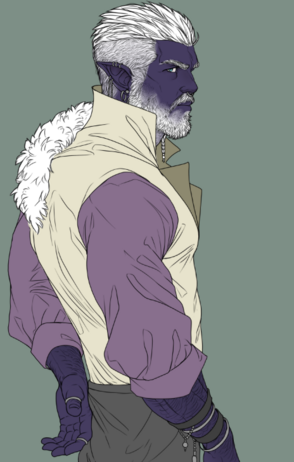
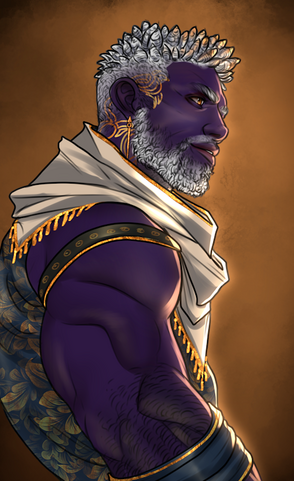
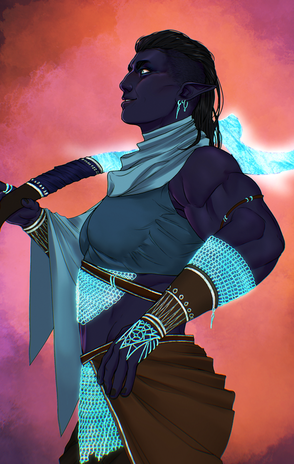
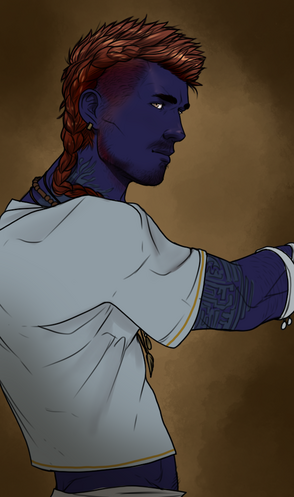
Language and Naming
Note, because Sihndar as a people are not a singular homogenous ethnicity, they don't really have a language of their own. That being said, since Elves are the majority of Sihndar, and because Altalar is the official Language in Drowda, this section will discuss Altalar from the perspective of the Sihndar. If a Character becomes Sihndar in their lifetime, or has parents who have held onto old cultural traditions, they might only speak Ailor or Eronidas languages, and maintain their naming conventions. People who become Sihndar obviously also do not magically learn Altalar, so they tend to keep their own languages and names. Sihndar language has remarkably remained consistent with early Allorn Altalar, and continued to develop along with the language spoken by the other Elves insofar it never developed a dialect. This was largely because the Sihndar were very dependent on outsider help, early on, especially from their Elven kin in the south, so it would be detrimental to linguistically diverge and no longer be able to communicate with them. That being said, Altalar as a language is verbose and does not serve the Sihndar quite as well on the battlefield. This is why the Sihndar both speak Altalar and so-called Pig-Altalar, which is a form of Altalar where many concepts, phrases and ideas have been replaced with singular words to expediate communication. It is still mutually intelligible with Altalar, but sounds like Altalar "caveman" speech to anyone who only speaks Altalar. Altalar as a language is a fantasy language that borrows some verbage from modern-day Spanish but cannot be taken one to one. Altalar is meant to change much of the vocabulary by softening hard consonants, stressing vowels, and generally smoothing out the pronunciation. A good example might be the words "Adios, Gracias, and Hola" Altalar does not contain the consonants D, R, or H from these examples. To make these words sound more in-lore Altalar, Adios would become Alïos, Gracias would become Ce'lias, and Hola would become Äula. It is not recommended to try and translate whole sentences from Spanish, this is purely for the flair of some word usage in day-to-day roleplay. When it comes to naming, Sihndar naming conventions somewhat differ from the other Elven cultural basis. A common habit for Sihndar is to add "Sihn-" as a prefix to their names, for example Sihn-Noveyn or Sihn-Veani. Another common habit is for Sihndar names to start with an X, such as Xenia or Xivar. This can even be combined to form Sihn-Xenia or Sihn-Xivar. Keep in mind that most Sihndar have a public-facing name that isn't their actual name (which they keep secret, because Names give Demons power), while having a more private name for truly close ones.
- Example Male Altalar Names: Ëasiel (Daniel), Lüsas (Lucas), Näul (Raul), Noveyn (Robert), Äuonshe (Jorge), Lavlo (Pablo), Mancel (Marcus), Sönsalo (Gonzalo), Na'ael (Rafael), A'losso (Alfonso).
- Example Female Altalar Names: Samila (Camilla), Isaveyl (Isabel), Sa'alia (Natalia), Siliana (Clara), Fisonia (Victoria), Savniella (Gabriella), Veani (Beatrix), Nassissa (Fransisca), Eyfa (Eva).
- Example Unisex Altalar Names: Sil (Gil), Aleycis (Alex), Ëasi (Dani), Eysmeynlea (Esmeralda), Äuiamey (Jaime), Monshaa (Morgan), Qüiem (Quim), Feyno (Vero), Savia (Gabi), Cimme (Kim).
The Sihndar have completely ejected the traditional Elven naming customs of long names with prefixes and suffixes based on social class and heritage. This is because they did not adopt the old Allorn Nobility system, in fact there are no class distinctions among the Sihndar.
Brief History
The Sihndar were originally Suvial, Teledden, and Fin'ullen members of the Cult of Drovv, a highly militaristic order and Allorn Cult that centered around martial training. Some of the Allorn Empire’s greatest champions and physical warriors were Drovv Cultists, who followed the unusual teachings of the Drovv Race that settled on the Drowda continent. The Drovv people were a warrior-monk race of bipeds with long necks and small heads, but four arms with which they wielded khopeshes with great skill. For several hundreds of years, this was all the Cult of Drovv did, until the outbreak of the last Void Invasion. The Void Invasion instantly wiped out the Drovv people and culture (though they put up a very tough fight), the first to fall to the Demons spewing forth from the Void Tear in Drowda, quickly followed by the Velheim colonists who had settled the area. The Cult of Drovv was quick to deploy, along with the Allorn armies, but marched to their doom in the face of the Demon tide. When Cataclysm occurred and the Void Tear closed without explanation, a small part of the Cult of Drovv was still intact and preached to the few fighting guilds and soldiers left in the Allorn Empire that their duty lay north. They reasoned that for the thousands of years of debauchery, genocide, deceit and corruption, the Allorn had a collective guilt to undo their sin through an eternal vigilance against Demons. The Cult of Drovv gained a large following and traveled to Drowda to quickly set up makeshift forts and start fighting the never-ending Demon tide that still remained, severed from the Void but not any less dangerous. For the Elves still in Drowda, the magical essence erupting during Cataclysm bombarded their bodies and physically changed them to what is seen as an entirely separate people in the modern era. The Cult of Drovv eventually renamed itself to Sihndar, or the “Old-ones who bear Sins” in Ancient Altalar. From then on, their never-ending watch started, though quickly on, they sent out parties into the wider world, in search of aid for their homeland that the rest of the world would eventually grow complacent to. It should be noted that in the modern era, this spiritual self-penitance for debauchery is no longer an ideological belief among the Sihndar. Over time the ideas of sin punishment were replaced with the generally held belief that Spirits are the single most dangerous threat to the continued existence of the world and that the people of the world should unite to beat back their demonic tides. There certainly are still debauchery-regretting penitents among the Sihndar, but they are far in the minority.
Conflicts & Alliances
A lot of MassiveCraft's lore is constructed around conflicts that are based on religious, historical, or societal grievances. This section aims to set out the various conflict and alliance points for the Sihndar, while also attaching some nuance so that there is wiggle room for players to not get stuck in endless loops of arguing the basics of societal conflict without clear Character Development or Resolution. When lore sets up a Character to be bigoted or hateful, there is the recommendation that through interacting and learning with different people in Regalia, Characters develop a more complex understanding of the conflicts that they are inherent to.
- Allorn Elves: Even if the penitent ideology of the Sihndar has fallen to the wayside, the Sihndar still consider the Allorn Elves guilty of the excesses that caused the Void Invasion to begin with. This gives them a natural inclination to be critical and disdaining towards anyone who is Pro Allorn.
- Lanlath: The Lanlath are some of the most supporting allies that the Sihndar have. Magic is not very common among the Sihndar, and broadly speaking the Lanlath have a lot of it, and it is harmless. Lanlath healers and supporting roles are common for Lanlath adventurers in Drowda.
- Velheim Ailor: The Sihndar and Velheim Ailor have a complicated relationship. Many of them serve as Sihndar in the various Holds, and many are also guest warriors who have come to aid. Yet, in Drowda, the Sihndar refuse to let the Velheim reclaim some of their historical artifacts from before Cataclysm.
- Ithanian Ailor: The Ithanian Ailor are some of the most generous donators to the Sihndar cause, notably because it allows the Ithanians to buy security without risking anyone of their own. Regardless of whether the intent is genuine, the Ithanians frequently campaign for others to also give money to the Sihndar cause.
- Kathar: Kathar and Sihndar are like two polar opposites. The Kathar and Sihndar despise each other deeply, and it is a fervent wish of the Sihndar to purge the Dread Empire, for its mere existence aids the Spirit Sovereigns in killing Sihndar. There is little love lost between these two.
- Suvial: Much like the Kathar, the Suvial are born enemies of the Sihndar, particularly because the Suvial entertain Spirits like toys and tools while the Sihndar die to fight them. The Suvial have a point, in controlling Spirits, but generally speaking, three rights don't make one wrong ignored by the Sihndar.
- Alignments: The Sihndar primarily fight Void Demons because Drowda is inhabited exclusively by Void Spirit Sovereigns, meaning there is a lot more nuance regardig Exist Alignment/Magic/Spirits, for more information, see the Estelley View on Spirits, Estelley being the predominant religion in Drwoda.
- Spirits: Sihndar hate Spirits for sure, but it is too simple to just assumpe that a Sihndar must kill any Spirit at all times without letting it speak. Sihndar attitudes to Spirits is more complicated, for more information, see the Sihndar View on Spirits, to understand Indeterminate Value of Spirits.
- Dragons: Dragons and their Dragon Faithful because of their Immortal War, are natural allies to the Sihndar in the fight against Spirits, but do not spend as much thought on it, as they do other threats. Dragons have never helped in Drowda, but have helped the Sihndar do their work in other places around the world.
Religions
- Estelley: Estelley is the faith of choice for the vast-vast majority of the Sihndar. This is also the predominant religion in Drowda, because Melca is a Drovv Goddess become Estelley, and because most Sihndar are Elves that continue their faith.
- Draconism: A small-ish minority of Draconism Sihndar exist both inside Regalia and Drowda. This is notably because some Dragon worshipers choose the Drowda Taint to help the Sihndar, seeing it as the most important thing to do in the current time against the Infection.
- Unionism: A very small minority of Unionist Sihndar exist in Regalia and Drowda. These are either Drowda Taint converts, or one of the many Ailor who are not Drowda Tainted that travel to Drowda to do work there for the Regalian Government or Sihndar Councils.
- Fornoss: A very small minority of Fornoss Sihndar exist in Regalia and Drowda. These are either Drowda Taint converts, or descendants of the various Velheim Ailor dominated Sihndar Holds close to Drowda, due to the proximity of the Three Skags and Drowda.
- Khama & Evolism: There are virtually no Sihndar who worship these religions. For Khama, the Sihndar think it's weirdly colonial to start worshiping a largely homogenous ethno-religion. Lastly, Evolism represents everything that is wrong with the worship of Spirits and sin to the Sihndar. To a point, the Sihndar might even consider Evolism worse than Death Cultism, because at least Death Cultists have simple beliefs that do not corrupt the good nature of people with seductive bargains and promises of power. The Sihndar obviously also detest all forms of Death Cultism, especially the Ordial variant, because death has an inverse proportional reaction on the creation and festering of Spirits in an area.
Culture
Families and Romance
Sihndar Childhood can best be described as brutal, dogmatic and repressive. Any child who acts outside of the norms of expected duty is harshly repressed and indoctrinated to follow the teachings of the Councils. 9 out of 10 Sihndar would claim they had a good childhood where their parents equipped them with all the necessary skills to survive in a cruel world, but many Regalian scholars would claim their people suffer from collective child abuse. The truth is somewhere in the middle: Sihndar children are exceptionally skilled when compared to the children of other people, and treated as adults much sooner. Gender norms barely exist in Sihndar society, as few Sihndar have time to think about gender identity when giant spiders assail their city walls (leading some, to come to sudden gender revelations in Regalia, when no longer fighting for their lives). Sihndar society is however extremely matriarchal. All leading figures are female, and female Sihndar are generally considered more valuable survivors in a bad situation because of the low birth rate in Drowda.
Clothing
Sihndar fashion is minimal and military-leaning. Hardened leather or light metal armor are frequently part of clothing accessories, but many Sihndar just as well wear only Elastan with minimal belting to retain speed. In Drowda, speed is often preferred over strength, as the majority of Demonic foes are incredibly agile, and so massive, bulky sets of armor only slow down warriors. On the opposite end of the spectrum, many of these Demons are hulking Colossi that require climbing to reach their head to kill, which would be impractical in heavy armor. Fabrics are often in dark colors to blend with the natural Drowda environment, though Sihndar who live abroad frequently partake in local fashion trends to blend in and appear more approachable. Sihndar aren’t truly very fussed about what to wear, because art and fashion are a disregarded aspect of their society. A notable invention and commonly worn piece of clothing among the Sihndar, is the crop top, which is widely worn by both men and women.
Other Cultural Habits
This is a loose collection of cultural habits and niches that you may use to make your Roleplay deeply grounded within the lore.
- Sihndar have an almost obsessive relationship with their preferred weapon. A weapon is something extremely personal to a Sihndar, and anyone touching a Sihndar’s weapon uninvited is quick to draw the rage of a Sihndar. Touching a Sihndar’s weapon without permission is equivalent to stabbing their child.
- Sihndar are internally very group-activity oriented, though not for competitive reasons. If one Sihndar excels at forging, several other Sihndar will quickly try to join in and work with that Sihndar to cooperate. This often results in many hobbies becoming group activities.
- Sihndar don’t have a concept of personal space. Holds are relatively cramped in terms of living conditions with several families sharing one home. Sihndar can very comfortably sleep next to strangers, hug strangers, or tolerate someone hovering very close to their face without becoming anxious or uncomfortable. This can also result in awkwardness of them invading others private spaces, especially Lanlath.
- Sihndar are fond of pets, and frequently keep several, though often more on the small leaning side so that they do not take up too much space, and preferably even animals with mild temperament so several different species can share the same cage or container. Insects are very common, especially since they seem more resilient to Drowda corruption than other animals.
- The Sihndar have developed a series of dancing techniques that looks more like actual physical combat, though never while actually hitting the dancing partner. Think of the real world-capoeira. This dance style obviously raises some brows during balls and parties in Regalia.
- Sihndar do accept leisure time and downtime in Regalia, especially to unwind their social batteries. In Regalia, living as a Sihndar involves a lot of making connections and always being on the move. As a result, Sihndar do permit so-called Sirh-time, or free-time where they don’t accept criticism for being lazy for an hour or two, and just lounging around or drinking alcohol and playing games.
- Sihndar love telling scary stories around a campfire, especially to non-Sihndar. Unlike the tall tales common in other Cultures, they do not need to rely on fiction to give entertaining accounts of the horrors their people fight against daily. Highly recommended for Lore Stories written by the Sihndar player that other players may not have read yet.
- Sihndar often find themselves awed by the simple, natural beauty of the world around them. Having spent most of their lives under oppressive conditions, in dark, cramped spaces, a cool summer breeze and a sunset mean more to them than anyone else could understand.
- Sihndar war poetry is famous among their Elven cousins. They are considered to have some of the best heroic epics, up there with the lamentations of the Solvaan and the historical dramas of the Allorn, focusing on the bravado of legendary Demon-slaying heroes.
- Sihndar have a great love of duels. While their combat schools are focused around demon-slaying, they are full of inventive pair exercises. For a Sihndar to take someone else on as a training partner implies that they have a deep and trusting friendship, or partnership.
Recommended Playstyle
The Recommended Playstyle section explains some easy-to-enter niches that these people of Aloria function well in, or that fulfill their thematic niche. This is by no means an exhaustive list, and Players are encouraged to experiment, but this list should provide either inspiration or a great starting point from which to customize a character further. These Character Designs are guaranteed to provide lots of lore to work off of, and give players groups to interact with from the start.
- Sihndar Hunters are common providers of nature's animal bounty to the rugged populations of the Sihndar, leading to a good character design with investment in Ranger Point Buy and Athletic Point Buy.
- Sihndar Pursuers are adept at chasing foes and engaging in rapid movement, leading to a good character design with investment in Melee Point Buy and Training Point Buy.
- Sihndar Skywardens are the elite, religiously inclined warriors of Sihndar society, leading to a good character design with investment in Paladin Point Buy and Melee Point Buy.
- Sihndar Hold Captains are the leaders of Sihndar warrior detachments who leave the Holds for any reason, leading to a good character design with investment in Command Point Buy and Mounted Point Buy.
- Sihndar Herbalists, while rare, aid their People through the collection and cultivation of plant life, leading to a good character design with investment in Medical Point Buy and Chem Point Buy.
- Sihndar Exiles are those who lost their Holds and have been forced to adapt to a harsher world, leading to a good character design with investment in Cutthroat Point Buy and Adapt Point Buy.
- Sihndar Mages solely come from the Zarak Hold but are deeply steeped in magical learning, leading a good character design with investment in Magic Point Buy.
Trivia
- Other Elves sometimes refer to the Sihndar as Drowdar, which means “Those from Drowda”. While that is technically correct, the Allorn Elves consider and use this as an insult, because it refers to them as coming from a backwards province of the Allorn Empire.
- A common weapon style used by the Sihndar is the Khopesh. Not all Sihndar use a Khopesh however, many of them use a variety of other weapons, as well as Ranged and even Magical weapons. Even a few Puretek users have been spotted as of recently, though each Sihndar at least owns a Khopesh, which is considered a deeply personal artifact.
- Sihndar love tattoos, but tattooing is hard on their dark skin. As a result, they have started to use the ink produced from a special type of mushroom that is faintly bioluminescent, producing light blue ink.
| ||||||||||||||||||||||||||
| Accreditation | |||||||||
|---|---|---|---|---|---|---|---|---|---|
|
| ||||||||
